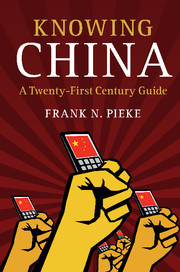Book contents
- Frontmatter
- Dedication
- Contents
- Preface
- Main Events in China, 1976–2015
- 1 Introduction: Knowing China
- 2 Why the Communist Party Will Not Fall from Power
- 3 China's Economy Will Continue to Grow, but Not Forever
- 4 Freedom without Universal Human Rights
- 5 From Empire to Nation, or Why Taiwan, Tibet and Xinjiang Will Not Be Given Independence
- 6 Not Just a Chinese Century
- 7 Conclusion: The Communist Party and China's Future
- Further Reading
- References
- Index
4 - Freedom without Universal Human Rights
Published online by Cambridge University Press: 05 July 2016
- Frontmatter
- Dedication
- Contents
- Preface
- Main Events in China, 1976–2015
- 1 Introduction: Knowing China
- 2 Why the Communist Party Will Not Fall from Power
- 3 China's Economy Will Continue to Grow, but Not Forever
- 4 Freedom without Universal Human Rights
- 5 From Empire to Nation, or Why Taiwan, Tibet and Xinjiang Will Not Be Given Independence
- 6 Not Just a Chinese Century
- 7 Conclusion: The Communist Party and China's Future
- Further Reading
- References
- Index
Summary
Perspectives on Freedom and Human Rights
Human rights are alien to totalitarian systems. This is not simply because such systems cannot allow unchecked freedom for fear of instability. The contradiction is much more fundamental than that. Totalitarianism doesn't even need human rights, because a society independent from the Party, the state, the military and the economic plan simply does not exist. Society is part of the totalitarian organism: there is nothing beyond the system that rights can or should protect.
In China this changed with reform. Organizations, families and people have gained interests and identities that they pursue and protect from the state and from each other. Political protection, informal support and interpersonal loyalties and obligations – practices carried over from totalitarian times and enhanced by the greater leeway created under reform – are commonly used to fill this gap. However, as the economy and society become more complex, the need is felt for uniformity and predictability in social relations and economic exchanges that only the rule of law and a rights-based legal system can provide. However, such rights are a gift of the Party and the state, instruments for the correct conduct of human relations and conditional on their proper use. But have these rights opened a Pandora's Box of the introduction of universal human rights that can be asserted independently from and, if necessary, against the Party and the state?
This question cuts right to the heart of the many prejudices, misperceptions and deliberate misconstructions in Western debates on China and the future world order and in Chinese debates on the dominance of the West and China's modernization. Understanding the development and reach of human rights is therefore essential to understand what contemporary China is and where it is going.
The Chinese government views human rights principally as an international relations issue. The 1989 Tian'anmen crackdown made the People's Republic of China the target for serious and systematic allegations of human rights abuses for the first time since joining the United Nations in 1972. In countering these allegations the government has taken a two-pronged approach. First, convinced that human rights are merely a Western stick with which to beat China, the government has sought a prominent role in international human rights forums and entered into a multitude of multilateral and bilateral discussions on human rights issues.
- Type
- Chapter
- Information
- Knowing ChinaA Twenty-First Century Guide, pp. 84 - 120Publisher: Cambridge University PressPrint publication year: 2016

